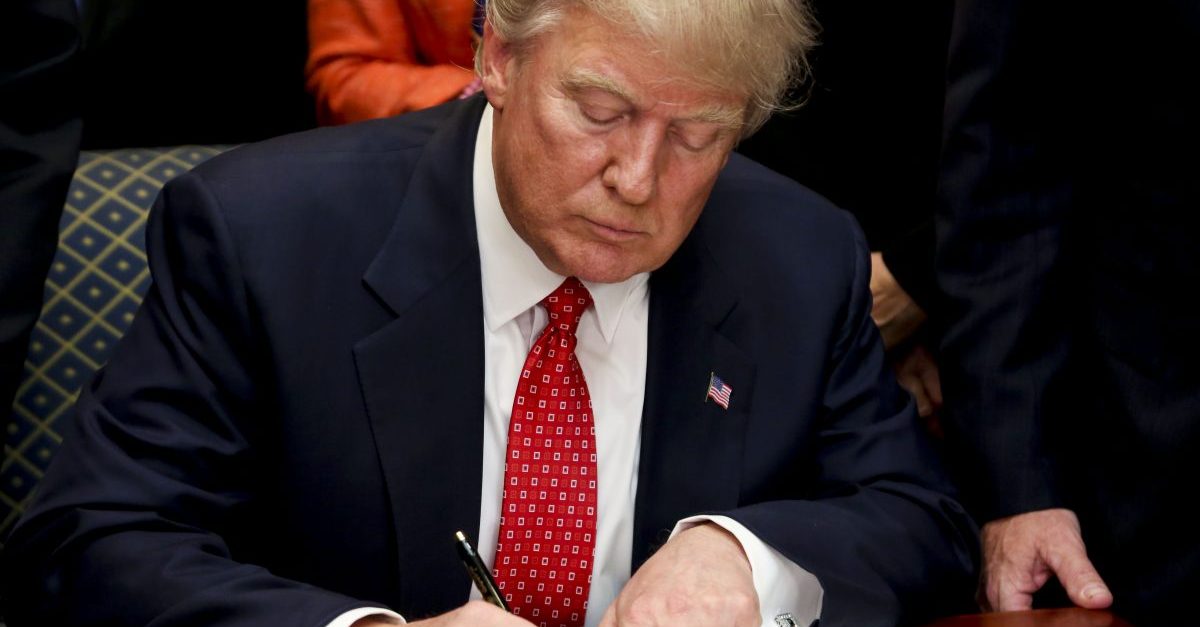
Despite nearly two years of “witch hunt” comments, it appears that President Donald Trump has now taken up the cause (or at least the appearance) of fighting against election interference. Wednesday, the president signed an Executive Order creating new sanctions for foreign people or organizations found to have meddled in American elections. National Security Adviser John Bolton and Director of National Intelligence Dan Coats discussed the order with reporters, explaining that actions such as social media influence operations, the release of hacked political documents, and attempts to breach election systems like voter registration databases would now be actionable.
According to Bolton and Coats’ explanation, here’s how things will work. When a foreign person or entity is suspected of suspicious action, the intelligence community will have up to 45 days to assess the situation. The intelligence community will then inform the Attorney General and the Department of Homeland Security about any verified findings, and then the AG and DHS will jointly have another 45 days to decide whether to trigger sanctions against the wrongdoer. The Treasury and State Departments will also have the ability to impose additional penalties when deemed appropriate.
Trump’s order is not country-specific, and will reportedly punish not only attempts to interfere with election infrastructure, but also disinformation and propaganda efforts like the kind Russia has been accused of carrying out during the 2016 presidential election.
On the surface, this all certainly sounds good. Our intelligence agencies have been clear that foreign interference in the 2016 election sought to bring about Trump’s presidency, so it’d probably be a good idea if we kept an eye out for similar interloping in the future.
However, Bolton’s statement to press that Trump’s order “sets up the framework within which these decisions on sanctions can be made for election interference” isn’t quite accurate. Trump didn’t “set up” that framework — Barack Obama did. Back in 2016, while much of the country still smarting from Trump’s election, President Obama ordered just the kind of sanctions for foreign election interference for which Trump appears to take credit today.
Here is some of the relevant text of President Obama’s December 2016 order entitled, “TAKING ADDITIONAL STEPS TO ADDRESS THE NATIONAL EMERGENCY WITH RESPECT TO SIGNIFICANT MALICIOUS CYBER-ENABLED ACTIVITIES:”
“Section 1. (a) All property and interests in property that are in the United States, that hereafter come within the United States, or that are or hereafter come within the possession or control of any United States person of the following persons are blocked and may not be transferred, paid, exported, withdrawn, or otherwise dealt in:
(i) the persons listed in the Annex to this order;
(ii) any person determined by the Secretary of the Treasury, in consultation with the Attorney General and the Secretary of State, to be responsible for or complicit in, or to have engaged in, directly or indirectly, cyber-enabled activities originating from, or directed by persons located, in whole or in substantial part, outside the United States that are reasonably likely to result in, or have materially contributed to, a significant threat to the national security, foreign policy, or economic health or financial stability of the United States and that have the purpose or effect of:
(E) tampering with, altering, or causing a misappropriation of information with the purpose or effect of interfering with or undermining election processes or institutions;”
Although Obama’s Executive Order demanded strict sanctions for meddlers, then-President-Elect Trump wasn’t impressed. His reaction? A characteristic call to “move on,” from what he repeatedly depicted as a non-problem. According to Politico, when the Trump White House was asked why the president signed a new executive order instead of simply using the one Obama had put into place, it had no response.
In addition to the forget-about-Obama’s-order-and-focus-on-mine theatrics, here’s also a bit of political drama going down between President Trump and Congress over this Executive Order. Senators Marco Rubio (R-Florida) and Chris Van Hollen (D-Maryland), are co-sponsors of the DETER Act, a bill that would require the president to sanction Russian actors found to have interfered in a United States election. DETER also has an additional safeguard; it would prevent the president from suspending or eliminating sanctions unless the Office of Director of National Intelligence reported to Congress that the Kremlin had not interfered in a U.S. election for “at least 2 presidential election cycles.” Viewed against the backdrop of DETER’s harsh Russian sanctions, Trump’s Executive Order – which leaves lifting sanctions to the discretion of officials at the Treasury and State Departments – appears significantly less potent.
The Washington Post asked John Bolton a question that easily comes to mind — whether Trump’s Executive Order was motivated by the widespread criticism that Trump has been too deferential to Russia. Bolton categorically denied any such motivation, and offered the simple (and in this case, incredibly opaque) rationale — that Trump’s actions, “speak for themselves.”
[Image via Aude Guerrucci-Pool/Getty Images]
This is an opinion piece. The views expressed in this article are those of just the author.